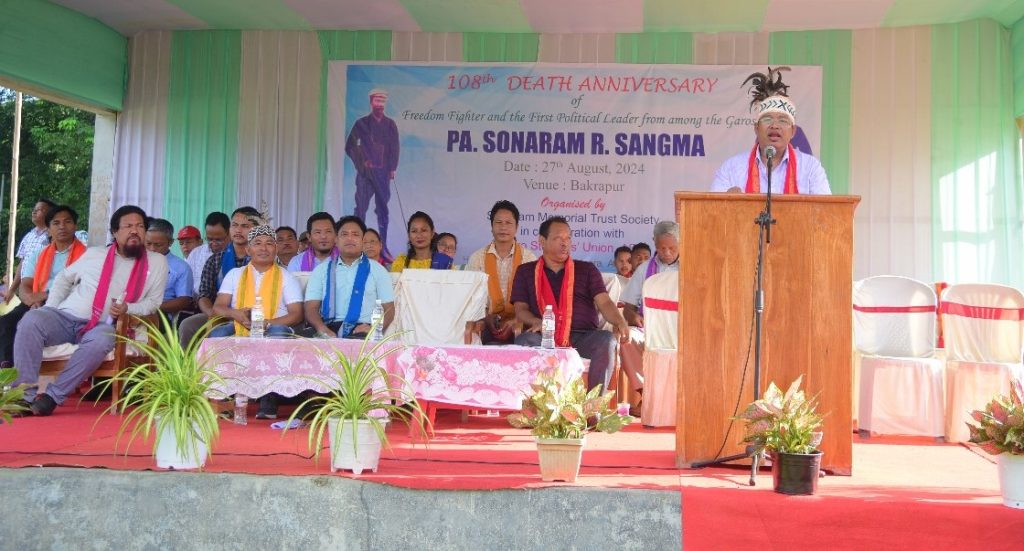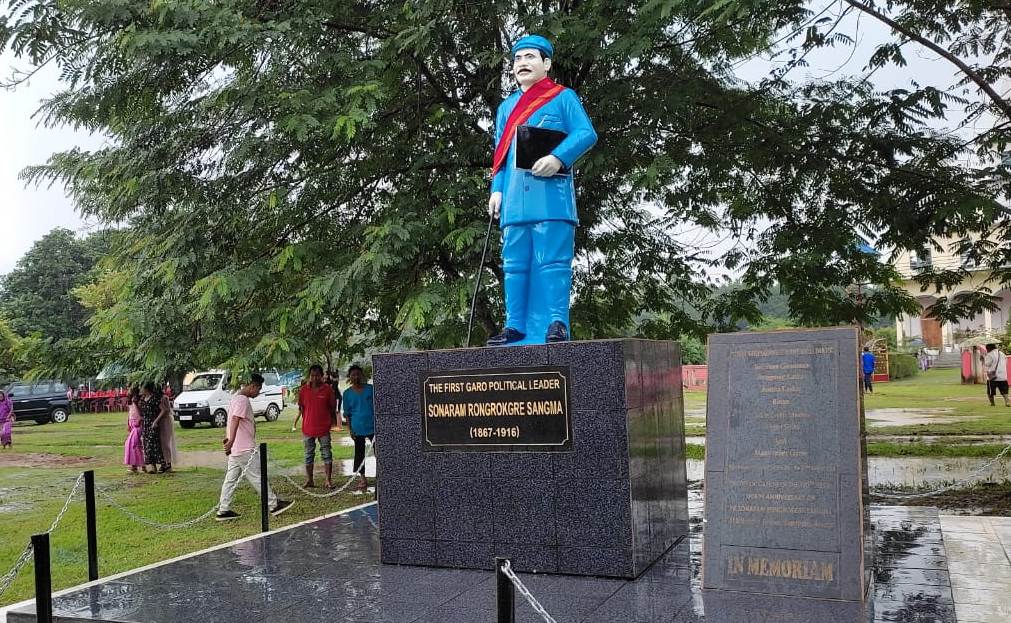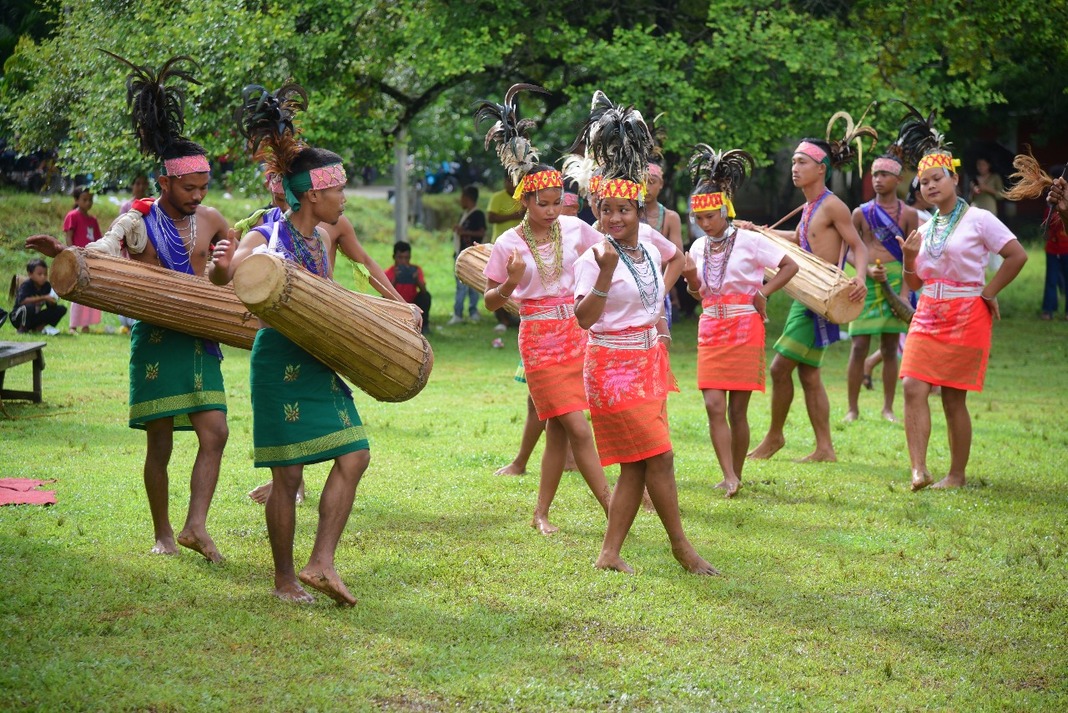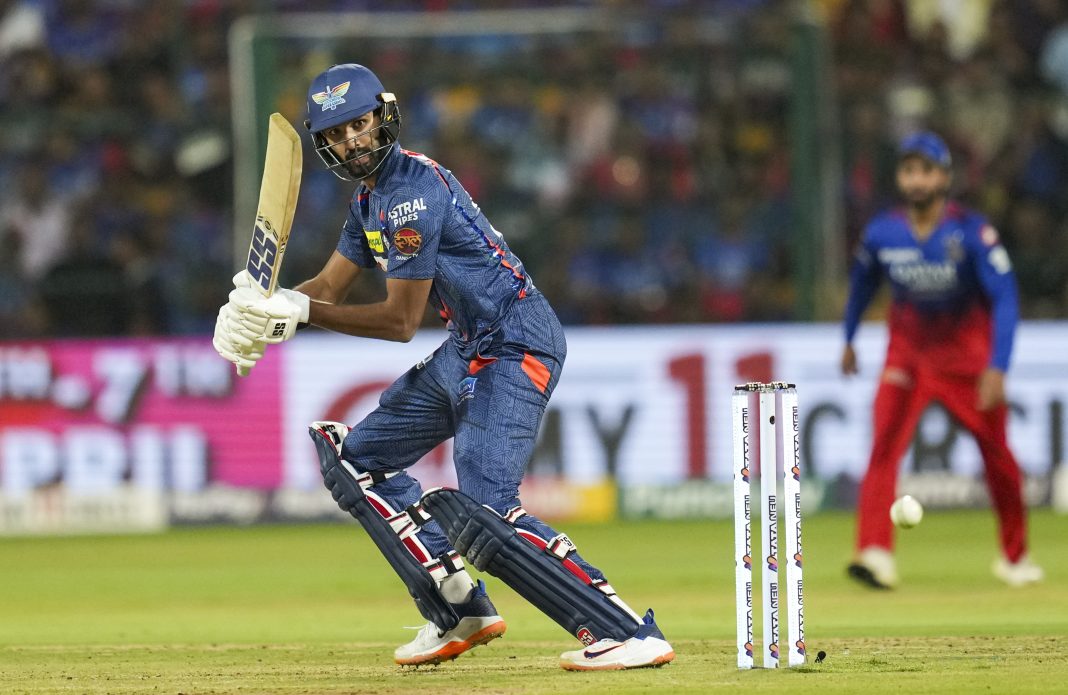Dudhnoi, Aug 28: Sonaram Sangma- freedom fighter and political activist who took on the British Government to secure the political voice and land rights of the Garos, more than a century ago, was fondly remembered on his 108th death anniversary at Bakrapur village, near Dudhnoi in Assam on Tuesday.
The annual observance was organized by the Garo Students Union of Assam State Zone in collaboration with the Sonaram R Sangma Memorial Trust Society and several Garo groups.
Albinush R Marak, Chief Executive Member heading the oldest political and administrative institution of Garo Hills- the Garo Hills Autonomous District Council, led the dignitaries and public in paying rich tributes to Late Sonaram Sangma.
“Late Sonaram Sangma took on the British government before Mahatma Gandhi and other freedom fighters. There should be widespread publicity and dissemination about Sonaram R. Sangma, so that the coming generation will come to know about his freedom struggle against the British,” said CEM Albinush Marak at the commemoration ceremony.
The significance of Late Sonaram Sangma’s legacy was in bringing the Garos from both the plains of Assam and the hills of present Garo Hills together to fight for their rights during a time of great suppression of peoples’ rights by the then ruling British Raj. And he was able to do so by challenging them in several legal battles in court, while simultaneously taking out a non-violent movement.
Born in a hamlet called Na’chirongdik, situated in the North Eastern region of the Garo Hills in 1867, Sonaram had his early education at the Nishangram Primary School (in Assam) and then at the Tura Mission School. He served the British India Government both as a road Mohurer and as a Vaccinator.
It was during these trips to the remotest corners of Garo Hills that he witnessed the plight of his fellow tribesmen.
Large areas of Southern Goalpara, called Habraghat Pargana, had once been part of the Garo kingdom under Garo king Habrasen (Abrasen) but had been annexed and made part of the British Zamindari.
The Garos living under the so called Nazarana Mahals were subjected to pay tax called Nazir to the British and vast stretches of virgin forests under the Garo Hills were getting converted into government land by the British,depriving the indigenous A’chiks of their customary and traditional practices of Jhum Cultivation.
Many Garos were also forced to work as labourers without any payment or remunerations for their services.

Sonaram Sangma took on the government over these crucial issues by beginning a non-violent movement against the British in the year 1899- years before Mahatma Gandhi began his Non-Violence Movement. He also submitted a series of memorandums to senior government officials through legal counsels at the Calcutta High Court.
His boldest step was in December of 1902, when he gathered hundreds of Garo volunteers and marched from the Garo village of Damra to Dolguma to announce their decision not to pay any land revenue to the Bijni Raj.
It led to his arrest along with several other Garo Nokmas and Pundits. They were thrown into Dhubri jail for some months.
In 1905, an inquiry Commissioner, J C Arbeitnott, was sent to the Garo areas to find out the causes of the recurring troubles. He submitted his report to the Government of India in 1908.
The verdict of the Government of India acknowledged the loss of territory by the Garos, but the government expressed its inability to restore the same.
Although the primary demand of Sonaram Sangma for the restoration of the Garo kingdom’s land under Habraghat Pargana was left unfulfilled, yet, he succeeded in getting the remaining three demands of the Garos fulfilled.
The British Government acknowledged the demand for Narzana Mahals; the de-reservation of forest and the demand for paid labour. The British halted further conversion of forest areas into Government reserved forest and the labourers engaged for work and to carry bags and baggage of the Government officers on tour duty, were henceforth paid.
Post the final verdict, Sonaram Sangma continued his legal fights in the Calcutta High Court, submitting prayers and petitions to the various Government authorities. While continuing his fights for the cause of the Garo nation, he fell ill one day at Goalpara and was brought to the house of his niece at Bakrapur. He breathed his last on 27th August 1916 and was consigned to a grave at the Bakrapur Cemetery.

“Sonaram was a true A’chik nationalist and patriot. He was the first Garo who conceived and spread the idea of Pan-Garoism. He organized the Garos living in different corners of the Garo areas, united them as one and led them to fight for justice. While doing all these, he used non-violent methods for furthering his cause for the protection of his own people and the preservation of the territorial possessions of the Garos’ forefathers. The greatest contribution of Sonaram R Sangma is in the field of social-political thoughts and ideas. His adoption of the method of non-violent techniques for furthering and promoting his noble causes for dispensation of justice deserved special mention, which the people and the nation states all over the world greatly appreciate and follow,” said Garo leader Desal Bimik R Marak while reading out the life history of the first Garo political leader.
Other guests who came to pay their respects included guest of honour Frylin R. Marak, the Executive Member of Rabha Hasong Autonomous Council. Nikman Marak, Deputy CEM of GHADC, Tura, Devan G. Momin, Devanita R. Marak, General Councillors of RHAC, Tengsak G Momin GSU Central Executive Committee, president, Tura, among others.
Tengsak G Momin, President of GSU central executive council, Tura appealed to the Assam and Meghalaya governments to publish Late Sonaram R. Sangma’s freedom struggle against the British.
During the media interaction, Frylin R. Marak, EM, RHAC announced that RHAC chief Tankeswar Rabha has given an assurance to erect Sonaram Sangma’s statue, in line with other freedom fighters, so as to be enable future generations to learn about the fight for his peoples’ freedom.




